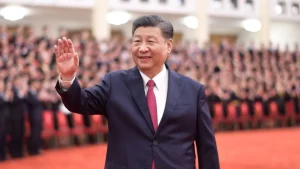Xi Jinping, the President of China, has recently claimed that the United States Intentions aims to provoke China into attacking Taiwan. This assertion has heightened tensions between the two superpowers and added another layer of complexity to the already intricate relationship between China, the US, and Taiwan. This article explores the context, implications, and reactions surrounding Xi Jinping’s statements, providing an in-depth analysis of the geopolitical landscape.
Historical Context

China-Taiwan Relations
The relationship between China and Taiwan has been fraught with tension since the end of the Chinese Civil War in 1949. The war resulted in the establishment of the People’s Republic of China (PRC) on the mainland and the retreat of the Republic of China (ROC) government to Taiwan. Since then, China has regarded Taiwan as a breakaway province, while Taiwan has maintained its status as a separate political entity.
US Involvement in Taiwan
The United States has played a significant role in Taiwan’s defense since the 1950s, providing military aid and support. The Taiwan Relations Act of 1979 solidified US commitment to Taiwan’s defense, although it stopped short of guaranteeing military intervention. The US policy of “strategic ambiguity” aims to deter both a unilateral declaration of independence by Taiwan and an unprovoked attack by China.
Xi Jinping’s Claims
The Accusation
Xi Jinping has accused the United States of deliberately encouraging China to attack Taiwan. According to Xi, the US aims to use Taiwan as a pawn to undermine China’s rise and maintain American hegemony in the Asia-Pacific region. This accusation suggests that the US is manipulating Taiwan’s status to provoke a military conflict, thereby weakening China.
Chinese Government’s Perspective
From Beijing’s viewpoint, US actions, such as arms sales to Taiwan and diplomatic engagements, are seen as provocations that challenge China’s sovereignty. Xi’s claims reflect a broader narrative within Chinese leadership that the US is intent on containing China’s growth and influence.
US Response
Official Statements
The US government has categorically denied Xi Jinping’s allegations. American officials argue that their policies towards Taiwan are aimed at preserving peace and stability in the region. They emphasize that the US remains committed to the One China policy while supporting Taiwan’s self-defense capabilities.
Strategic Objectives
The US maintains that its actions are not intended to provoke conflict but to deter aggression and maintain the status quo. By supporting Taiwan, the US aims to uphold democratic values and ensure a balance of power in the Asia-Pacific region.
Taiwan’s Reaction
Government Stance
Taiwan’s government has expressed concern over Xi Jinping’s statements, viewing them as an escalation of China’s coercive tactics. Taipei continues to seek international support and strengthen its defense capabilities to counter potential Chinese aggression.
Public Opinion
The Taiwanese public remains wary of China’s intentions. Xi’s claims have heightened fears of military conflict, but they have also galvanized support for Taiwan’s independence and its alliances with like-minded democracies.
Implications for Geopolitics
Regional Stability
Xi Jinping’s claims could further destabilize the Asia-Pacific region. Increased military activity and heightened rhetoric from both China and the US raise the risk of miscalculation and conflict. Neighboring countries, such as Japan and South Korea, are closely monitoring the situation, as any conflict over Taiwan would have significant regional repercussions.
Global Power Dynamics
The dispute over Taiwan is a microcosm of the broader US-China rivalry. Xi’s accusations highlight the deepening mistrust between the two superpowers. As China continues to rise, the US faces the challenge of adapting to a multipolar world order while managing its relationship with China.
Comparative Analysis: Xi Jinping’s Claims vs. US Policy
| Aspect | Xi Jinping’s Claims | US Policy |
|---|---|---|
| Intentions | US wants China to attack Taiwan to weaken China | Preserve peace, stability, and democratic values in the region |
| Actions | Provoking through arms sales, diplomatic engagement | Supporting Taiwan’s defense, maintaining status quo |
| Strategic Goals | Undermine China’s rise and maintain US hegemony | Balance of power, deter aggression, uphold international norms |
| Regional Impact | Increased tensions, risk of conflict | Stability through deterrence, support for allies |
| Global Implications | Deepening US-China mistrust, shift in power dynamics | Adaptation to multipolar world, management of superpower rivalry |
Analytical Overview
Historical Grievances
China’s historical grievances regarding Taiwan are rooted in its civil war and the subsequent division. For China, reunification is a matter of national pride and sovereignty. The US, on the other hand, views Taiwan through the lens of Cold War alliances and contemporary strategic interests.
Military Postures
Both the US and China have increased their military postures in the region. The US conducts freedom of navigation operations in the South China Sea and strengthens its alliances with regional powers. China, meanwhile, has ramped up military exercises near Taiwan and modernized its armed forces.
Diplomatic Strategies
Diplomatically, the US seeks to rally international support for Taiwan, engaging in multilateral forums and building coalitions. China counters this by leveraging its economic influence and promoting its vision of a new international order.
Analysis Table
| Aspect | China (Xi Jinping’s Claims) | US Policy |
|---|---|---|
| Historical Context | Taiwan as a breakaway province | Defense of a democratic entity |
| Military Postures | Increased exercises near Taiwan | Freedom of navigation operations |
| Diplomatic Strategies | Economic leverage, new order promotion | International support for Taiwan |
| Regional Stability Impact | Potential for conflict | Deterrence and balance |
| Global Implications | Shift in power dynamics | Adaptation to multipolar world |
Comparative Table
| Aspect | Xi Jinping’s Claims | US Policy |
|---|---|---|
| Intentions | US provocation to weaken China | Peace, stability, and democracy |
| Actions | Arms sales, diplomatic engagements | Supporting defense, status quo |
| Strategic Goals | Undermine China’s rise | Balance of power, deterrence |
| Regional Impact | Increased tension and conflict risk | Stability and support for allies |
| Global Power Dynamics | Deepening mistrust, power shifts | Managing rivalry, multipolar world |
By examining these claims and policies through historical, military, and diplomatic lenses, we gain a comprehensive understanding of the tensions surrounding Taiwan and the broader US-China rivalry. The path forward requires careful diplomacy, strategic restraint, and a commitment to international norms to avoid escalation and maintain peace in the region
Conclusion
Xi Jinping’s claim that the US wants China to attack Taiwan underscores the Intentions fraught nature of US-China relations and the precarious status of Taiwan. As tensions rise, the potential for miscalculation increases, with significant implications for regional and global stability. Understanding the perspectives and strategic objectives of each player is crucial for navigating this complex geopolitical landscape.












